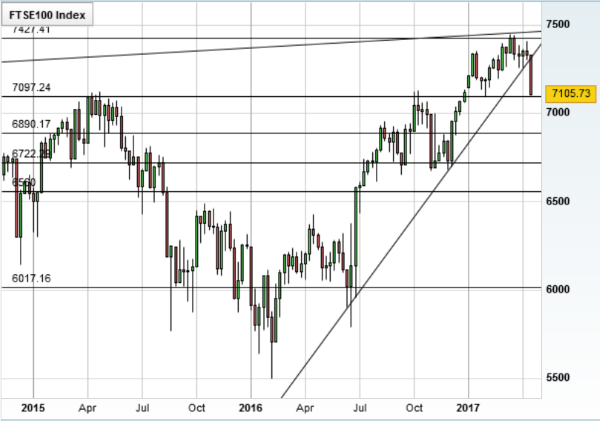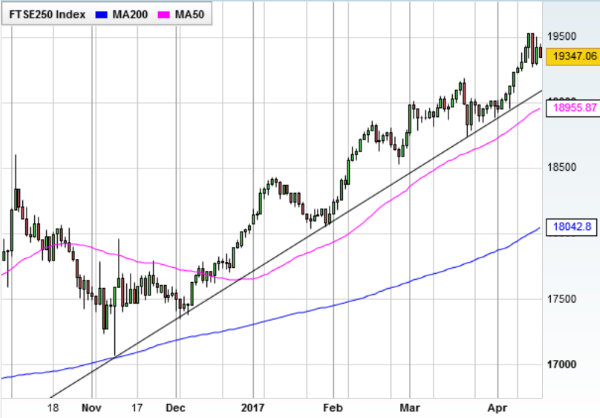Here's what the UK election could mean for share prices
20th April 2017 12:09
by Lee Wild from interactive investor
Share on
In precisely seven weeks' time we'll be off to the polls and what by all accounts will be a cakewalk for the ruling Conservative party. Labour is in such a mess, pollsters tells us the Tories could extend their majority in the Commons to well over 100 seats. That mandate would empower Prime Minister Theresa May in future Brexit negotiations and avoid a general election just as talks are winding up. As we've seen in the past few days, there will be serious consequences for investors here.
Most obvious has been the impact on both sterling and the . As soon as May called the snap election, the pound rocketed briefly to $1.29, its highest in over six months and up from $1.2515 earlier in the session.
An inverse relationship with the blue-chip share index still very much intact, the FTSE 100 and its army of big overseas earners plunged. The rout has stalled at 7,098, or 139 points since late-morning Tuesday, although overnight futures prices were even lower. Since the recent peak of 7,406, it's down more than 300 points, or 4%.

As it stands, currency analysts are queuing up to tip sterling to $1.30, $1.35 or as high as $1.40. Sterling crashed from $1.50 to $1.19 at its worst following the EU referendum, the lowest in over three decades, and it wasn't that long ago that plenty were forecasting $1.10, or worse, parity.
It's hard to believe this election is enough on its own to trigger such a major U-turn, but many who sold the pound are now buying it back, which should at least underpin recent gains.
For London-listed multi-nationals who've enjoyed a significant currency tailwind since the Brexit vote, that makes further upside ahead of the election on 8 June much more difficult.
Firms reporting results in sterling have made a killing, receiving more pounds and pence for every dollar or euro earned. While there's still a substantial year-on-year benefit – sterling traded at around $1.44 this time last year – expectations of bigger gains have been priced in.
For the FTSE 100, our resident technical analyst Alistair Strang had already made a call down to 7,115 before May's shock announcement. He wrote on Monday night: "…below 7,298 would bother us as it suggests 7,266 initially with secondary, if broken, at a pretty shocking 7,115 points". The index closed last night at 7,114.36.
A dip below 7,100 clearly spells trouble, and Alistair warns "below 7,109 hints strongly at a future 6,937". Beyond that there's a risk of further downside.
Currently, on the weekly chart, the FTSE 100 is within range of the 23% Fibonacci retracement of the rally from the June pre-Brexit closing low to last month's record high at 7,429.
However, while the international large-caps struggle to keep their head above water, the mid-cap index is flexing its domestic muscle.
It's off the pace slightly Thursday, but at one point during the mid-week session, the FTSE 250 was just 22 points off a record high. And, while the blue-chip index is now in negative territory for 2017, the second-tier is up 7%.

Remember, far more of these businesses make money in the UK and import goods from overseas, so a stronger, more stable domestic economy really counts. As we've seen already this year, a weak pound increases import costs, so any increase in the value of sterling will help.
Check out retailers like , which rose 5% after the election news, cushions and curtains chain , and the housebuilders like , and . Bring both extremes of the Tory party into line and May's housing strategy could have positive consequences for UK builders.
That the few risers in the FTSE 100 include , , , and reinforces the point.
This week's upgrade for UK growth by the International Monetary Fund is certainly well-timed. Admittedly, recent IMF forecasts have proved over-optimistic, but an improvement in estimates for GDP growth in 2017 to 2% from 1.5% previously can only be positive.
In conclusion, there still looks to be value among mid-caps. True, they have significantly outperformed the top 100 recently, and some may indeed look fully-valued at best, but the likelihood of a serious negative shift would appear less obvious than for the blue chips. Only a close below the uptrend - currently around 19,100 - would give cause for concern.
Among the top flight, unless we see sterling reverse – unlikely – a trade either side of 7,100 would appear the best we can hope for ahead of the general election. And that does not take into consideration any potential fallout from a shock in the French polls, which will give a clear winner a month before us.
Further out, however, the case for regularly adding equities to a well-diversified portfolio remains intact. With interest rates glued to record lows, the many UK quoted firms growing profits comfortably, trading on sensible valuation multiples and paying generous dividends offer a sensible home for investors' money.
With five-year fixed-rate mortgages at 1.3% for 60% loan to value, Jeremy Grime, financials analyst at broker finnCap, agrees.
"All I know is I can buy equities yielding 3-5% that will grow their dividends, and I can borrow money at rates less than inflation. The equity market is so far from where the bond market is there is an arbitrage you can drive a few super yachts through.
"While consensus is negative on the economy and anecdotally there is a lot of cash out there it seems we haven't yet enjoyed the inevitable equity party. There's going to be a squash in the doorway when they realise they want a bit more risk."
This article is for information and discussion purposes only and does not form a recommendation to invest or otherwise. The value of an investment may fall. The investments referred to in this article may not be suitable for all investors, and if in doubt, an investor should seek advice from a qualified investment adviser.